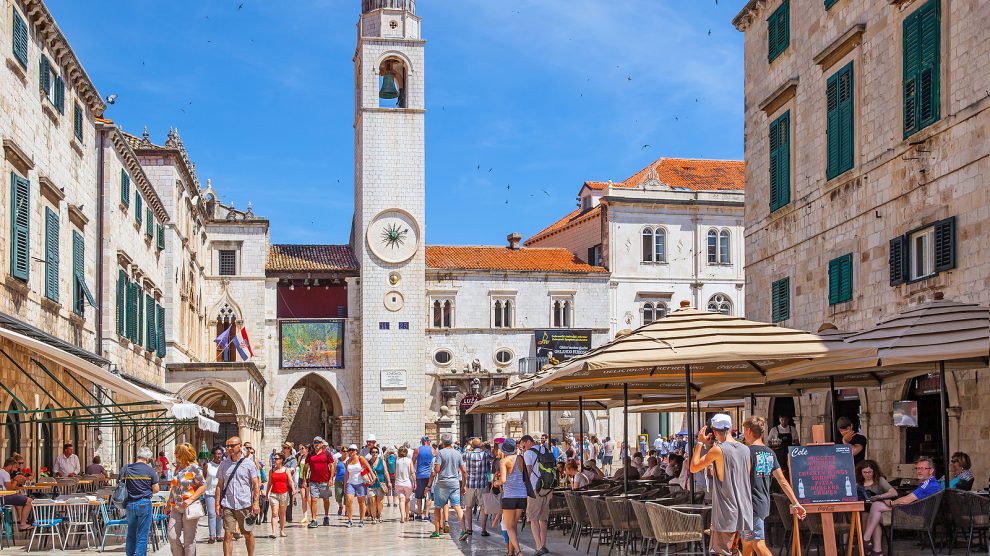Croatia is no stranger to crowds of tourists. But now that the country has entered both the Schengen Area and eurozone and its Covid-19 slump is officially over, it wants to make the industry more sustainable.
The hit HBO television show Game of Thrones, part of which was filmed in the Croatian city of Dubrovnik, taught viewers around the world what so many already knew: Croatia is beautiful.
Having seen the number of visitor arrivals stagnate for several years at around 50 million, the launch of the series in 2011 precipitated a surge of interest in the country.
- Boosting IT sector could help Croatia close income gap
- Croatia’s Rimac moves beyond EVs
- The five best CEE music festivals of 2023
According to the World Bank, by 2015 more than 55 million tourists were choosing Croatia for a vacation, while in 2019, over 60 million tourists arrived in the country whose own population barely tops four million. It was the highest number ever of visitors recorded.
However, when the Covid-19 pandemic partially shut down the travel industry in 2020, that number sank to 21.6 million. It was the fewest number of tourists received by the country since 1996, its first tourist season after the end of the Croatian War for Independence in November 1995.
Prosperity and headaches
Tourism has brought both prosperity and headaches to the small Adriatic nation.
The industry accounts for around 20 per cent of Croatia’s gross domestic product (GDP)—the highest of any country in the European Union. Such a high level of dependency on tourism made it especially vulnerable to Covid-19. In 2020, GDP plummeted by almost nine per cent.
Tourism also takes a toll on the very reason so many first venture to the country: its pristine nature and coastline.
In 2018, half of all Croatia’s tourists visited in the two-month period of July and August, and the high intensity of tourism during this short season places pressure on public infrastructure and the environment that can be unsustainable. The tourists’ demand for seafood is seasonally concentrated, leading to periods of overfishing that prevent local fish and crab populations from being able to replenish.
Ecologically important buffer zones around national parks and coastal areas are becoming heavily developed. Tourist boats and cruises increase marine littering and noise pollution while damaging corals and seagrass meadows by anchoring.
In Dubrovnik, which has long struggled to cope with the number of visitors brought in by cruise ships, Mayor Mato Franković said last month that this year no more than two ships will be allowed to dock in the city at any one time.

A crucial moment
In December 2022, EU countries voted unanimously to admit Croatia into the Schengen Area, facilitating passport-free travel with the rest of the bloc. While Croatia joined the EU in 2013, EU tourists from other countries have had to pass through border checkpoints for the past decade.
That changes this season.
Since January 1, Croatia’s land and sea borders—and thus, their queues—with EU neighbours have been abolished. Air borders were removed on March 26.
Croatia saw another huge change on January 1: it became the twentieth country to join the eurozone. Its local currency, the kuna, has been phased out. While some Croatians have complained about price hikes since the shift in January, euros were already widely used in the country. Some 45 per cent of Croatians already held a euro bank account, and in 2020, over 70 per cent of goods exports were traded in euros.
Passport- and border-queue-free travel and the ability to use their home currency will make vacationing in Croatia even more attractive for hundreds of millions of EU residents.
As the country’s economy recovers from the Covid-19 blow to tourism, it has an opportunity to reboot one of its most important industries in a more sustainable fashion.
“We are raising quality, we do not want mass tourism,” says Croatian Minister for Tourism and Sport Nikolina Brnjac.
“We are expanding the offer, tourists are staying more, the number of overnight stays is increasing throughout the year.”
Unlike many news and information platforms, Emerging Europe is free to read, and always will be. There is no paywall here. We are independent, not affiliated with nor representing any political party or business organisation. We want the very best for emerging Europe, nothing more, nothing less. Your support will help us continue to spread the word about this amazing region.
You can contribute here. Thank you.


